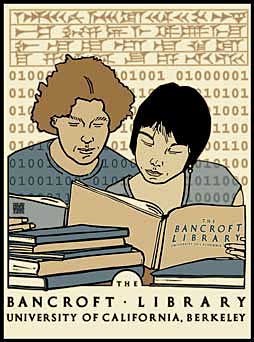
Click on image for detail
(220) Bancroft Library:
Edition of 2655 of which 125 copies are signed 1-125, 26 copies are signed A-Z as artiss's proofs.
Eight dedication copies are signed. Three sets of progressives are signed.
September 5, 2008
17-5/8" x 24"
9 colors
Paper: Mohawk Superfine 100# Cover
ModelS: Jim Blair & Li Jiang
Client: Bancroft Library, University of California, Berkeley
1-125: Saint Hieronymus Press
A-Z: Artist's own use
Progressives: All sets to Saint Hieronymus Press.
“For Eisenberg the emphasis on making tangible artifacts reflects his disappointment that earlier software projects have proved so ephemeral. As an author of programs for the Tandy Color Computer, he has seen his work become inaccessible in a span of just a few years. The software itself is still perfectly serviceable, but no one has a machine to run it. If HyperGami eventually succumbs to the same fate, he will at least have an office full of brightly colored souvenirs.” — Brian Hayes, “Pleasures of Plication,” American Scientist, Volume 83, November-December 1995, page 506
“One hundred years from now no one will find your e-mail lovingly bundled in ribbon and hidden under the bed.” — Advertisement for Crane’s writing papers, 1996. copywriter, Kara Goodrich.
“My husband and I met via computer. We
exchanged gobs of delightful, witty e-mail after
meeting through friends. And then his computer
crashed, and all the ones and zeroes that documented
our courtship vanished.” -- L. D. Kirshenbaum,
San Francisco, January 8, 2000
We remember Ur of the Chaldees because their records were inscribed in imperishable clay. When a city burned around them the clay was baked and just got harder and stronger.
Electronic media have no more permanence than human memory. Rather than externalizing memory, it is re-internalized and liable to the same extinction as individuals. Interest in the past dwindles and disappears. The past becomes fabulous, a golden age from which mankind has fallen.
Half-remembered history is no history at all. Our fascination with the past is not universally shared, and there is no reason to suppose that it will continue indefinitely. Museums, self-trivialized, lose their appeal. Who wants to see sculptures made of preserved urine? Rooms full of dirt? Paintings entirely white? Nobody.
The mighty Hurian civilization, which persisted in the Fertile Crescent for three thousand years, was entirely forgotten. Its language, culture, monuments, traditions, religions all were utterly and completely lost without a single memory until their baked-clay records turned up, the code was cracked and they were revived from the dead.
There’s still something about a real letter
with real handwriting on it that’s just
not conveyed by e-mail. I have a letter written
by my great-great-grandmother in 1834 to her
own mother and it tells me about her in myriad
subtle ways that printed words alone would not.
I wonder if we’re seeing an end to history
of a sort. History polished clean of inessentials
that after a bit of time has passed turn out
to be the only parts that counted. The reason
we know about the Medes and the Persians is because
they insribed their dry accounts on material
that would not succcumb to the insults of time.
When the future loses interest in us and a still
more distant future stumbles across our remote
era, what will they find of us? Not our e-mail.
Probably the same sorts of imperishable artifacts
that allow us to puzzle out the lives of Australopithecus.
Tupperware. Empty Coke bottles. Perhaps they’ll
conclude that we lost the art of writing--which
we very well might. Look at the prediction of “Star
Wars”: clearly, Luke Skywalker lives in
an a-literate society. Computers and robots remember
everything and all communication is by spoken
words and pictures. Luke Skywalker and Han Solo,
near as I can tell, have no use at all for reading
and writing.
e-mail has no smell.
The cuneiform inscription, accompanying an image of Sennacherib (705 - 681 BC), King of Assyria, at the seige of Lachish, reads: “Sennachrib, king of the world, king of Assyria, sat on a throne and the booty of Lachish passed before him.”
The binary ASCII text reads: Fiat Lux